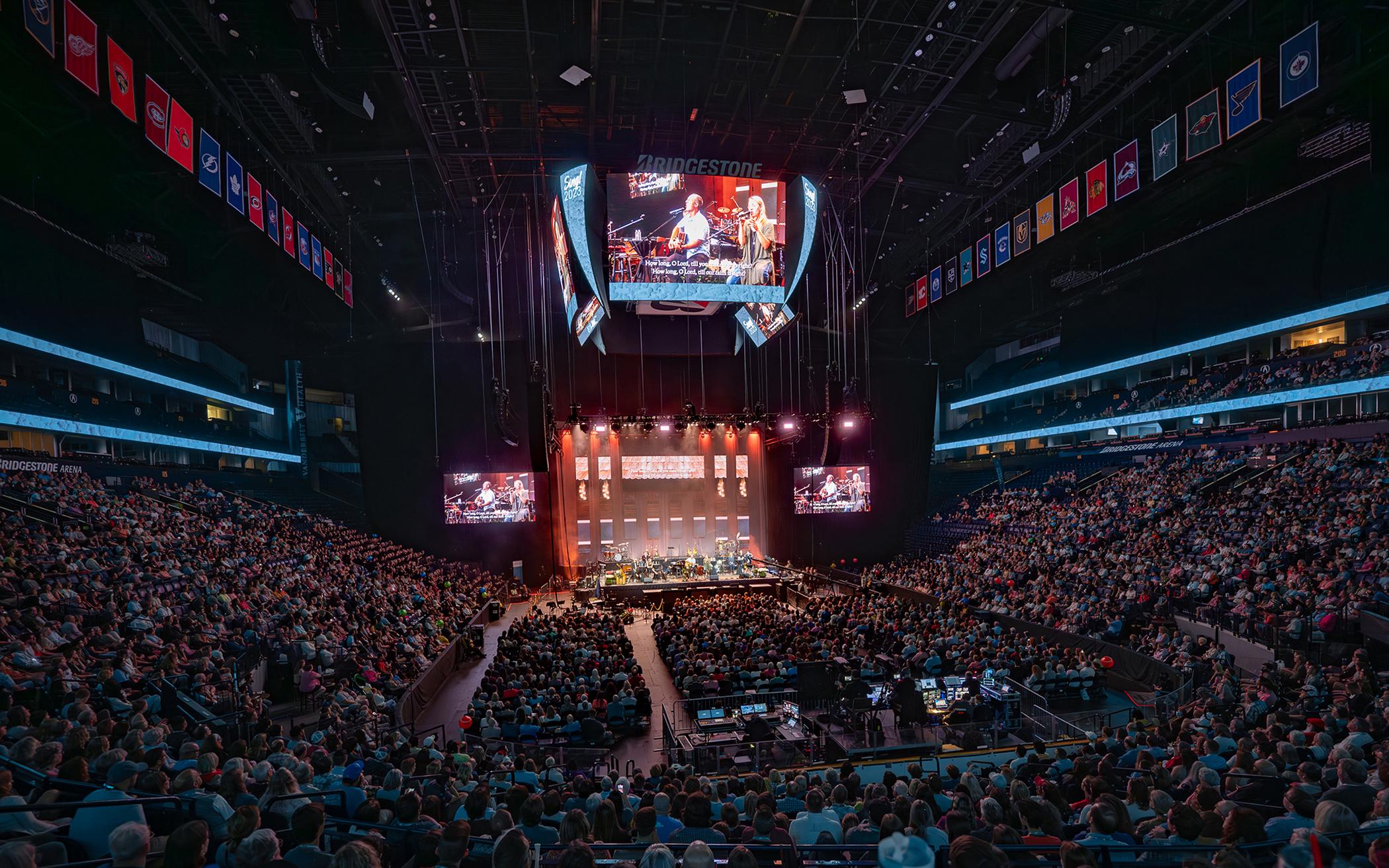The Banner has a subscription to republish articles from Religion News Service. This story by Grace Beckner was published on religionnews.com Sept. 12, 2023. It has been edited for length and Banner style.
The crowds seen buzzing in early September outside the Bridgestone Arena in Nashville, Tenn., were coming not to take in a basketball game or a concert, but to sing, write and bond over Christian hymns.
The annual Sing! Global conference, hosted Sept. 4-6, drew some 8,500 Christian worship music leaders and other church musicians, pastors, vendors and hymn composers from as many as 35 countries. (An estimated 80,000 others in 120 countries participated online.) They attended breakout sessions on congregational singing, songwriting and children’s and family ministry. Other sessions addressed themes such as “Hymns in Hard Places,” evangelism and singing at home. Participants listened to speakers, live recording sessions and late-night performances.
Most of all they come to sing together — tunes from historic hymnals, from Celtic traditions and new creations — and to share a common love and culture of sacred music.
“I like seeing all different denominations represented, kind of breaking down the walls and seeing the church at large,” said Amy Bauman, from Appleton, Wis. Over the hum of strangers getting acquainted in the lunch line, Bauman said she and her fellow singers had come to be reenergized and have their “flames reignited.”
While the Sing! Global conference was founded in 2017 by Keith and Kristyn Getty, a husband-and-wife hymn writing team, for more than a decade American worship services have started to leave traditional hymns behind.
Instead of historic pieces such as “Be Thou My Vision,” whose words date to the sixth century with music from the early 1900s, or “Love Divine, All Loves Excelling,” adapted in the mid-1700s by the Methodist Charles Wesley from a popular opera number of the time, the most popular church music now originates in bands associated with megachurches such as the Bethel Church network in California, Elevation Church in North Carolina, Atlanta’s Passion City Church (“How Great Is Our God”) and the global megachurch Hillsong (“Oceans”).
One recent study found that of the 38 most played songs, 22 were released by one of the four most prominent megachurches. An additional eight songs were released by artists with ties to those churches, and six more were collaborations with megachurch artists or cover songs.
Those who gathered in Nashville are in part a guard against the takeover by megachurch music, known as “praise and worship” songs. Such songs are palatably positive, easy for a large crowd to sing along to and focus on a personal, emotional closeness to God. But these features, critics say, come with theological vagueness and musical blandness.
“Unfortunately some of the modern music of contemporary Christian music has become almost secularized, or has become popular tunes but pretty shallow gospel,” said Mark Hosny, assistant professor of music and worship arts at Trevecca Nazarene University. “As believers, there is nothing wrong with upbeat songs. We’ve just got to be sure that what drives that narrative is talking about the gospel of Jesus Christ,” he said.
The Gettys answer this call, according to people who attended their conference.
“I think what sets these types of hymns apart from some of the current trends is that there are very specific, concrete things being said. It is not vague, it is not general,” said Cliff Johnson, a pastor from Hope, Arkansas, who attended the conference. “There is a very concrete truth being proclaimed, understood, and felt that you can build your life upon.”
Despite Sing! Global’s popularity, Hosny said he doesn’t expect churches to swing all the way back to traditional hymnody, though he sees it as a sign of a desire in congregations for a “deeper and richer” theology than what they have been getting.
Adam Perez, assistant professor of worship studies at Belmont University in Nashville, pointed out that the Gettys, with roots in the evangelical Reformed tradition, tend to write and record hymns that explicitly outline doctrinal truths. They provide a sense of theological and missional certainty to listeners, appealing to the desire for certainty in a complex world.
Perez recently completed a term on the board for the Hymn Society, founded in 1922, whose own conference is aimed at the people producing, writing and editing hymnals and songs for Presbyterians, Evangelical Lutherans, Episcopalians, Roman Catholics and United Methodists. “The hymns there are much more theologically liberal, much more open to ambiguous poetic devices,” he said.
Some attendees at Sing! Global noted how songs of faith have a role in handing Christianity down by providing a link to the witness of past generations.
“My grandmother was the one who always sang hymns, then my mom sang hymns, so for me it is a connecting, intergenerational faith that shows through hymns, specifically,” said one children’s music director from a Florida church. “I don’t really remember my grandmother necessarily sitting down and saying, ‘Hey, this is Jesus, let me tell you about him,’ but she sang ‘I’ll Fly Away’ while sweeping every day.”
c. 2023 Religion News Service
About the Author
Religion News Service is an independent, nonprofit and award-winning source of global news on religion, spirituality, culture and ethics.

